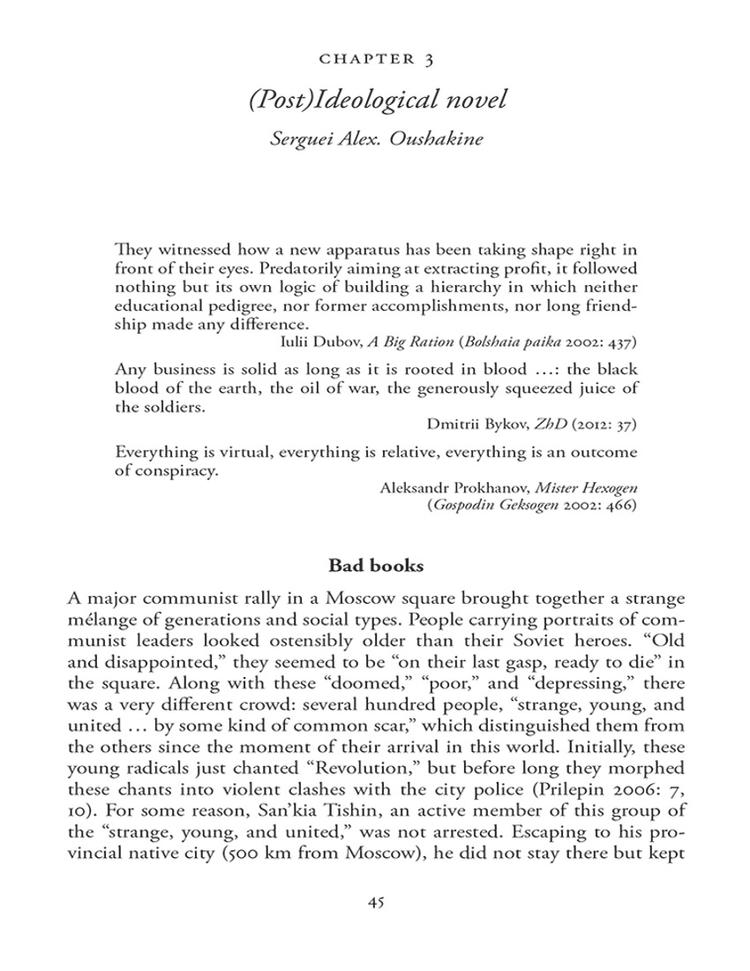Image

(Post)Ideological Novel
Publication Year
2015
Type
Book Chapter
Abstract
The ideological realism of these novels is not real; it is historicist. It works as a device aimed at creating certain discursive effects. Similar to the efforts of the Pre-Raphaelites in the second half of the nineteenth century, this ideological prose is a revivalist attempt to get back to “the roots” by transferring artistic investments from issues of expressive means and manners to that of content. Writers that I will discuss in this chapter seem to be abandoning the aesthetic conventions of Modernist prose with a speed and zeal equal to the Pre-Raphaelites’ desire to leave Mannerism behind....
What radically distinguishes the current redaction of the ideological novel from its Soviet predecessor is the fundamental negativity of the current genre. Disinhibiting ideological values might be useful for organizing narratives, but these narratives work against the very values that structured them in the first place....
The three novels that I analyze describe three distinctive “disinhibition agents.” A Big Ration by Iulii Dubov depicts business as the key post-Soviet agent that unleashes creative energies, creating social and personal problems at the same time. In Alexander Prokhanov ’s Mr. Hexogen , it is power
that crushes barriers and motivates people. Finally, ZhD by Dmitrii Bykov (English translation Living Souls , 2010) forefronts issues of blood . National belonging emerges in it as a way of being and a form of knowledge production, and the nation provides a teleology and an ontology: past, present, and future are all determined by birth. Published within a few years of each other, these novels describe major driving forces that have been changing Russia since the mid-1980s.
None of the novels is a masterpiece. Th eir visions are schematic, their messages are simplistic, and their styles are familiar. Like Pre-Raphaelite art, these examples of the ideological novel belong to the aesthetic of trash and kitsch. Excessively wordy and oversaturated with narrative structures,
they are interesting not because of their plot twists or stylistic discoveries. It is their symptomatic function that makes them stand apart.
What radically distinguishes the current redaction of the ideological novel from its Soviet predecessor is the fundamental negativity of the current genre. Disinhibiting ideological values might be useful for organizing narratives, but these narratives work against the very values that structured them in the first place....
The three novels that I analyze describe three distinctive “disinhibition agents.” A Big Ration by Iulii Dubov depicts business as the key post-Soviet agent that unleashes creative energies, creating social and personal problems at the same time. In Alexander Prokhanov ’s Mr. Hexogen , it is power
that crushes barriers and motivates people. Finally, ZhD by Dmitrii Bykov (English translation Living Souls , 2010) forefronts issues of blood . National belonging emerges in it as a way of being and a form of knowledge production, and the nation provides a teleology and an ontology: past, present, and future are all determined by birth. Published within a few years of each other, these novels describe major driving forces that have been changing Russia since the mid-1980s.
None of the novels is a masterpiece. Th eir visions are schematic, their messages are simplistic, and their styles are familiar. Like Pre-Raphaelite art, these examples of the ideological novel belong to the aesthetic of trash and kitsch. Excessively wordy and oversaturated with narrative structures,
they are interesting not because of their plot twists or stylistic discoveries. It is their symptomatic function that makes them stand apart.
Book Title
Russian Literature since 1991
Pages
45-65
Publisher
Cambridge University Press
Documents

